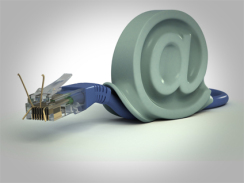 The Internet is a wonderful, magical and useful thing. The internet connects us to the rest of the world. The Internet has enough throughput to support a wide variety of tasks from sending emails to streaming videos. We depend on the Internet to be fast and reliable in this connected age, but the truth is, connection speed varies widely and this can create problems and limmitations.
The Internet is a wonderful, magical and useful thing. The internet connects us to the rest of the world. The Internet has enough throughput to support a wide variety of tasks from sending emails to streaming videos. We depend on the Internet to be fast and reliable in this connected age, but the truth is, connection speed varies widely and this can create problems and limmitations.
Perhaps you have noticed that ,from time to time, the Internet is a lot slower than usual. There are several culprits to internet slowness. It could be due to something using a lot of the bandwidth (bandwidth is the speed at which data can move into and out of your connection). Here are several common culprits to high bandwidth consumption.
- Streaming Media. If your employees watch video from services such as YouTube, Hulu, Vimeo or Netflix or listen to internet radio and music services, you may notice that the internet gets slower. Streaming Media services generally consume a steady chunk of your internet connection thruput, leaving less available for other activities and for other users on the network. Some companies restrict access to streaming media sites for that very reason.
- FTP sites. FTP sites host files, usually large ones, for transfer between people, companies and places. While somebody is downloading/uploading files to an FTP site there is less bandwidth left over for other activities, so the Internet will feel slower.
- Peer-to-Peer (P2P). P2P, or peer-to-peer connections are connections between two computers to transfer data such as video conferencing and file sharing using software such as BitTorrent, instant messenger or Skype. P2P services, especially torrents and other file sharing services of the like are bandwidth hungry. Especially on slower connections, P2P file transfers can slow your internet to a crawl.
- Off-Site backup. Off-Site or Online Backup takes a lot of bandwidth while actively transfering files, leaving little to no thruput left over for other activities. For this reasion, off-site backup software will usually allow you to throttle the transfer speed to avoid using all of the bandwidth available. It’s also typical to schedule the backups to occur after hours, and/or to use full bandwidth after hours and less during business hours.
- VPN / Remote Access. VPN (Virtual Private Network) and Remote Access technologies give us remote access to applications and data. Transferring data through a VPN can consume a lot of bandwidth during the transfer. Remote Access technologies such as Remote Desktop do not generate that much traffic, but their performance suffers during lack of available bandwidth.
- Virus / Malware. Viruses and other malware in your network can slow down computers and consume internet bandwidth.
- Connectivity Issues. Connectivity issues, although not a form of bandwidth consumption, are worth mentioning. Connectivity issues can degrade the ammount of bandwidth available to you. A poor quality connection or malfunctioning network device can cause you to get less throughput than is available.
If your Internet is slows down at certain times, you may want to check to see if any of these six reasons are the culprit. Here are a few suggestions:
- What level of internet service do you have? If you subscribe to a basic level of service with some providers, you will not have much bandwidth to begin with. Check with your provider to see what speed you’re subscribed to and see how that compares with what is available.
- Keep your anti-virus software up to date and conduct periodic scans to look for viruses and malware.
- Be sure that your computers and servers are not backing up during peak internet usage periods. Reduce the bandwidth used by off-site backups during peak use times or schedule the backups to occur during off-peak times.
- Disallow or block sharing media and file transfer services not related to business.
- Schedule file transfers for times when bandwidth isn’t consumed by other activites.
- Deploy a traffic shapping solution or a institute a use policy that defines what activities are permitted and restricted on your network.
If you require assistance with your internet connection, as always, feel free to call us at (888) 777-WURX for a hassle free no obligation consultation. We can assist you with identifying the cause of slow internet and show you various solutions for managing your internet connection for better performance.




